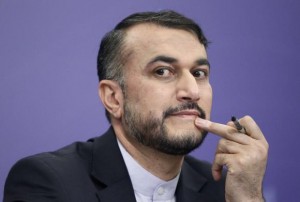 Iran's Deputy Minister for Arab and Foreign Affairs Hossein Amir Abdollahian attends a news conference in Moscow, September 10, 2013.[/caption]
Iran's Deputy Minister for Arab and Foreign Affairs Hossein Amir Abdollahian attends a news conference in Moscow, September 10, 2013.[/caption]TEHRAN (FNA)- Iranian Deputy Foreign Minister Hossein Amir Abdollahian described the heavy verdicts handed to Muslim Brotherhood members and leaders in Egypt as a source of concern, and said Iran is displeased to see Egypt is distancing itself from the path of democracy.
"We are not pleased that Egypt has deviated from the path of democracy," Amir Abdollahian said, addressing a Q&A meeting in Tehran University on Sunday.
The deputy foreign minister said Iran still has many questions and ambiguities with regard to the recent developments in Egypt.
"Iran is concerned about the apprehension and imprisoning of the leaders of the Muslim Brotherhood as well as popular Islamic movements in Egypt," the Iranian deputy foreign minister said, adding that Tehran has informed the government in Cairo of its concerns.
Amir Abdollahian, however, reiterated that Iran would be pleased to see Egypt's return to the trend of democracy and elections, and said, "Unfortunately what we are witnessing in Egypt today is a division of the people of that country into two (opposing) groups, and this is not in the interest of the Arab country."
The Iranian deputy foreign minister expressed the hope that "the elections in Egypt will be held under equal conditions and equal footing for all, where everyone will have the opportunity to take part in the election".
Last month, Iranian Foreign Ministry Spokeswoman Marziyeh Afkham voiced Tehran's deep concern about political tensions in Egypt, specially the recent verdicts issued by the country's court against the Muslim Brotherhood members.
�The issuance of these rulings can have numerous social and political repercussions and encourage the enemies of Egypt to further aggravate the ongoing situation,� Afkham said at her weekly press conference in Tehran.
�The Islamic Republic of Iran closely monitors the country�s (Egypt) developments � and respects the great revolution of this country as well as (the need for) the maintenance and realization of its achievements,� she added.
Afkham also stressed the importance of establishing national unity among civil institutions and movements to meet the Egyptian people�s demands and preserve the country�s historical and civil glory.
Afkham emphasized that the court verdicts run counter to the �principle of tolerance�.
In late April, an Egyptian court recommended the death sentence for the leader of the Muslim Brotherhood and 682 supporters, and handed down a final capital punishment ruling for 37 others.
Seeking the death penalty for Mohamed Badie, the Brotherhood's general guide, is certain to raise tension in Egypt, which has been gripped by turmoil since the army removed the Brotherhood from power last year, Reuters reported.
The 37 death sentences were part of a final judgment on 529 Muslim Brotherhood supporters who were sentenced to death last month. The remaining defendants were sentenced to life in jail.
Death sentence recommendations in the case involving Badie will be passed on to Egypt's Mufti, the highest religious authority. His opinion is not legally binding and can be ignored by the court.
The biggest trials in Egypt's modern history have reinforced fears among human rights groups that the military-backed government and anti-Islamist judges are bent on crushing dissent.
The authorities have branded the Brotherhood a terrorist group, an allegation it denies.
By Fars News Agency
The Iran Project is not responsible for the content of quoted articles.










